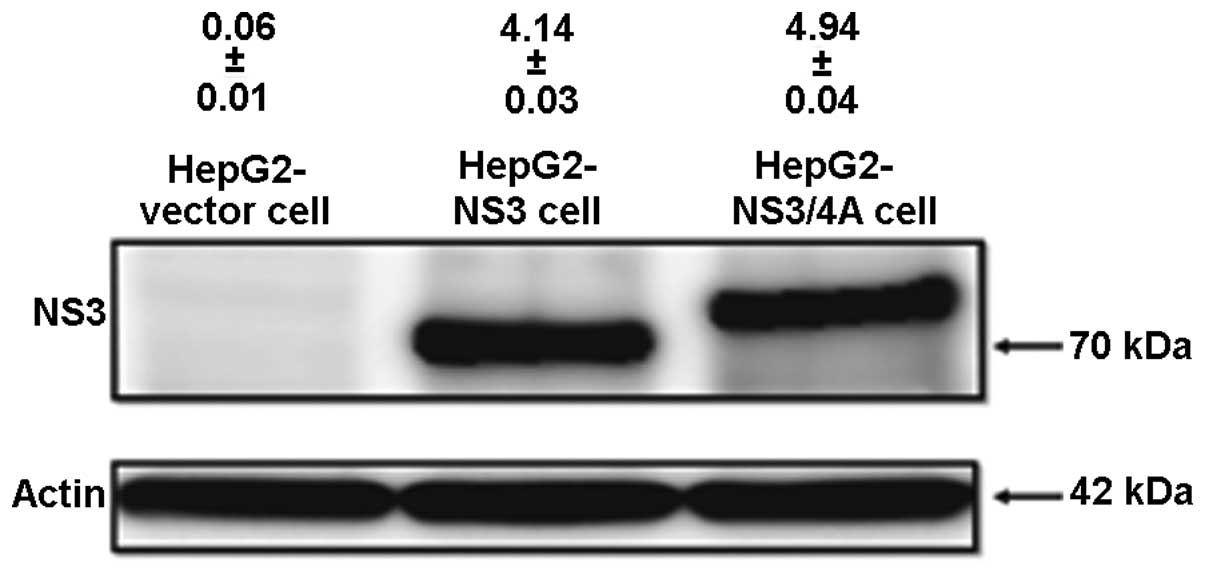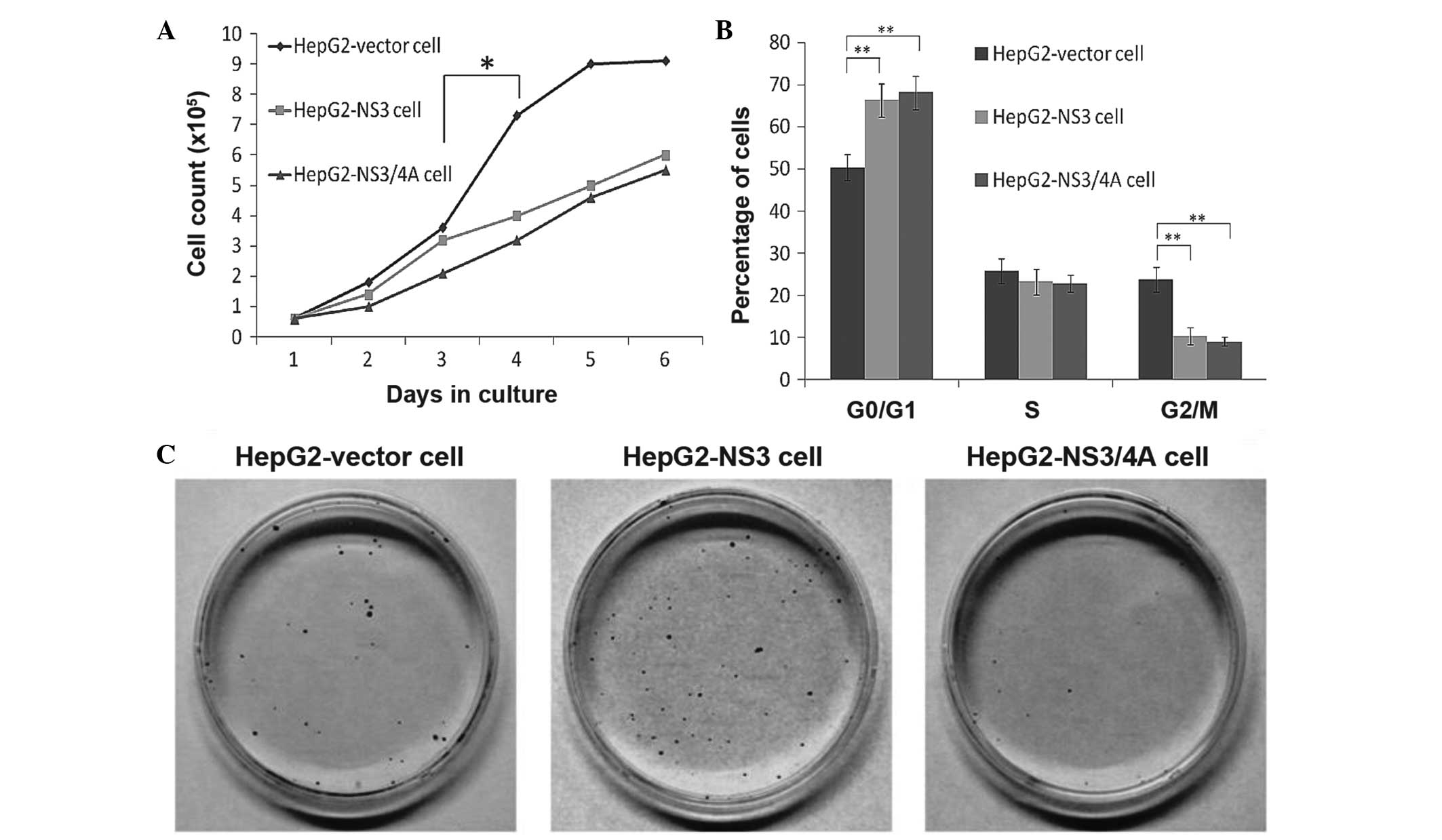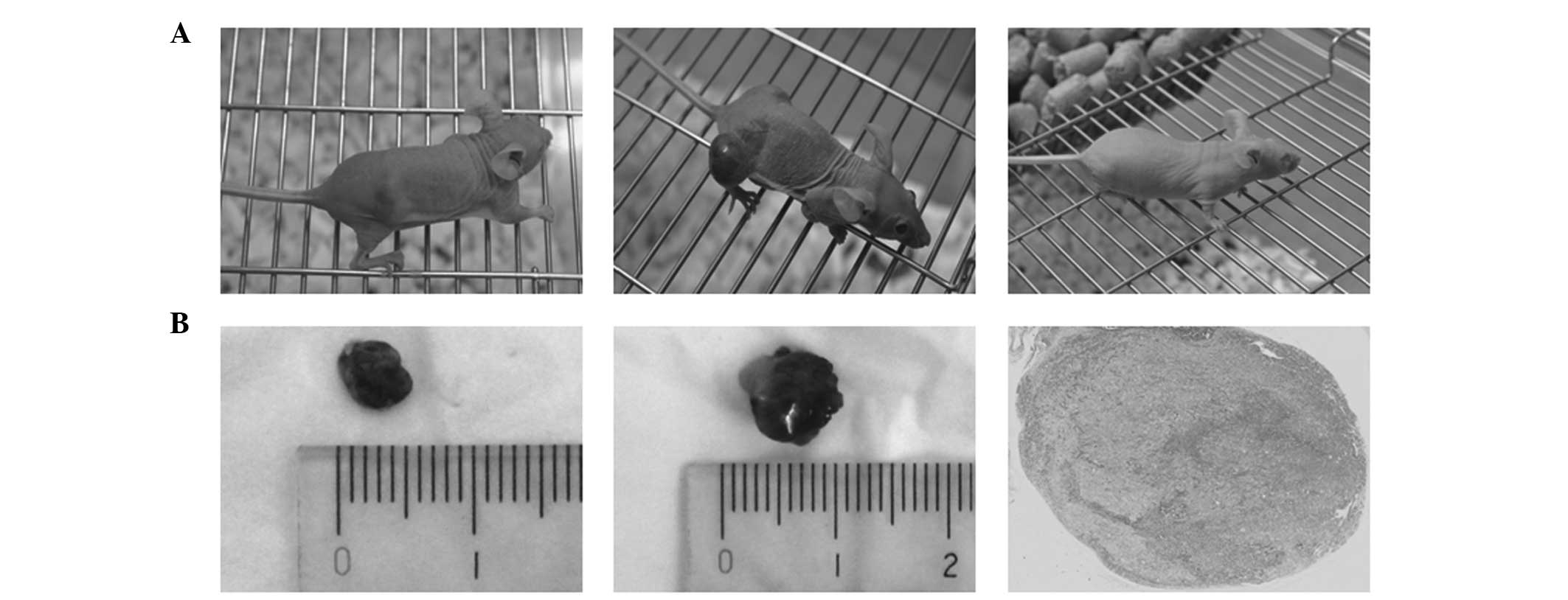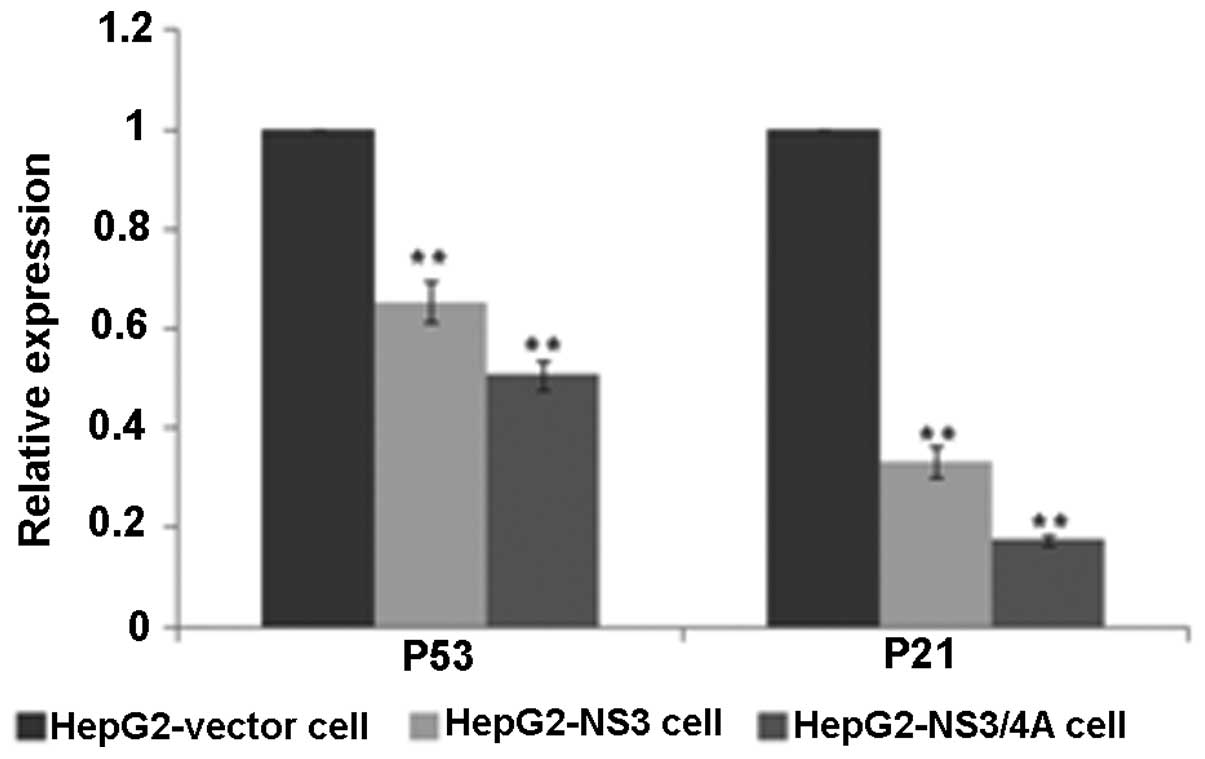|
1
|
Koike K, Tsutsumi T, Fujie H, Shintani Y
and Kyoji M: Molecular mechanism of viral hepatocarcinogenesis.
Oncology. 62(Suppl 1): 29–37. 2002. View Article : Google Scholar : PubMed/NCBI
|
|
2
|
Takamizawa A, Mori C, Fuke I, et al:
Structure and organization of the hepatitis C virus genome isolated
from human carriers. J Virol. 65:1105–1113. 1991.PubMed/NCBI
|
|
3
|
Neddermann P, Tomei L, Steinkühle C,
Gallinari P, Tramontano A and De Francesco R: The nonstructural
proteins of the hepatitis C virus: structure and functions. Biol
Chem. 378:469–476. 1997.PubMed/NCBI
|
|
4
|
Penin F, Dubuisson J, Rey FA, Moradpour D
and Pawlotsky JM: Structural biology of hepatitis C virus.
Hepatology. 39:5–19. 2004. View Article : Google Scholar : PubMed/NCBI
|
|
5
|
Grakoui A, Levis R, Raju R, Huang HV and
Rice CM: A cis-acting mutation in the sindbis virus junction region
which affects subgenomic RNA synthesis. J Virol. 63:5216–5227.
1989.PubMed/NCBI
|
|
6
|
Hong Z, Ferrari E, Wright-Minogue J, et
al: Enzymatic characterization of hepatitis C virus NS3/4A
complexes expressed in mammalian cells by using the herpes simplex
virus amplicon system. J Virol. 70:4261–4268. 1997.
|
|
7
|
Suzich JA, Tamura JK, Palmer-Hill F, et
al: Hepatitis C virus NS3 protein polynucleotide-stimulated
nucleotide triphosphatase and comparison with the related
pestivirus and flavivirus enzymes. J Virol. 67:6152–6158.
1993.PubMed/NCBI
|
|
8
|
Kim DW, Gwack Y, Han JH and Choe J:
C-terminal domain of the hepatitis C virus NS3 protein contains an
RNA helicase activity. Biochem Biophys Res Commun. 215:160–166.
1995. View Article : Google Scholar : PubMed/NCBI
|
|
9
|
Sakamuro D, Furukawa T and Takegami T:
Hepatitis C virus nonstructural protein NS3 transforms NIH 3T3
cells. J Virol. 69:3893–3896. 1995.PubMed/NCBI
|
|
10
|
He QQ, Cheng RX, Sun Y, Feng DY, Chen ZC
and Zheng H: Hepatocyte transformation and tumor development
induced by hepatitis C virus NS3 c-terminal deleted protein. World
J Gastroenterol. 9:474–478. 2003. View Article : Google Scholar : PubMed/NCBI
|
|
11
|
Carthew RW and Sontheimer EJ: Origins and
mechanisms of miRNAs and siRNAs. Cell. 136:642–655. 2009.
View Article : Google Scholar : PubMed/NCBI
|
|
12
|
Jopling CL, Yi M, Lancaster AM, Lemon SM
and Sarnow P: Modulation of hepatitis C virus RNA abundance by a
liver-specific MicroRNA. Science. 309:1577–1581. 2005. View Article : Google Scholar : PubMed/NCBI
|
|
13
|
Hou W, Tian Q, Zheng J and Bonkovsky HL:
MicroRNA-196 represses bach1 protein and hepatitis C virus gene
expression in human hepatoma cells expressing hepatitis C viral
proteins. Hepatology. 51:1494–1504. 2010. View Article : Google Scholar : PubMed/NCBI
|
|
14
|
Murakami Y, Yasuda T, Saigo K, et al:
Comprehensive analysis of microRNA expression patterns in
hepatocellular carcinoma and non-tumorous tissues. Oncogene.
25:2537–2545. 2006. View Article : Google Scholar
|
|
15
|
Meng F, Henson R, Wehbe-Janek H, Ghoshal
K, Jacob ST and Patel T: MicroRNA-21 regulates expression of the
PTEN tumor suppressor gene in human hepatocellular cancer.
Gastroenterology. 133:647–658. 2007. View Article : Google Scholar : PubMed/NCBI
|
|
16
|
Gramantieri L, Ferracin M, Fornari F, et
al: Cyclin G1 is a target of miR122a, a microRNA frequently
down-regulated in human cholangiocarcinoma. Cancer Res.
67:6092–6099. 2007. View Article : Google Scholar : PubMed/NCBI
|
|
17
|
Hammond JB and Kruger NJ: The Bradford
method for protein quantitation. Methods Mol Biol. 3:25–32.
1988.PubMed/NCBI
|
|
18
|
Livak JK and Schmittgen TD: Analysis of
relative gene expression data using real-time quantitative PCR and
the 2−ΔΔCT method. Methods. 25:402–408. 2001. View Article : Google Scholar
|
|
19
|
EI-Serag HB, Marrero JA, Rudolph L and
Reddy KR: Diagnosis and treatment of hepatocellular carcinoma.
Gastroenterology. 134:1752–1763. 2008. View Article : Google Scholar
|
|
20
|
Kasprzak A and Adamek A: Role of hepatitis
C virus proteins (C, NS3, NS5A) in hepatic oncogenesis. Hepatol
Res. 38:1–26. 2008. View Article : Google Scholar
|
|
21
|
Moriya K, Fujie H, Shintani Y, et al: The
core protein of hepatitis C virus induces hepatocellular carcinoma
in transgenic mice. Nat Med. 4:1065–1067. 1998. View Article : Google Scholar : PubMed/NCBI
|
|
22
|
Lerat H, Honda M, Beard MR, et al:
Steatosis and liver cancer in transgenic mice expressing the
structural and nonstructural proteins of hepatitis C virus.
Gastroenterology. 122:352–365. 2002. View Article : Google Scholar : PubMed/NCBI
|
|
23
|
Kwun HJ, Jung EY, Ahn JY, Lee MN and Jang
KL: p53-dependent transcriptional repression of p21 (waf1) by
hepatitis C virus NS3. J Gen Virol. 82:2235–2241. 2001. View Article : Google Scholar : PubMed/NCBI
|
|
24
|
Siavoshian S, Abraham JD, Kieny MP and
Schuster C: HCV core, NS3, NS5A and NS5B proteins modulate cell
proliferation independently from p53 expression in hepatocarcinoma
cell lines. Arch Virol. 149:323–336. 2004. View Article : Google Scholar : PubMed/NCBI
|
|
25
|
Hassan M, Ghozlan H and Abdel-Kader O:
Activation of c-Jun NH2-terminal kinase (JNK) signaling pathway is
essential for the stimulation of hepatitis C virus (HCV)
non-structural protein 3 (NS3)-mediated cell growth. Virology.
333:324–336. 2005. View Article : Google Scholar : PubMed/NCBI
|
|
26
|
Randall G, Panis M, Cooper JD, et al:
Cellular cofactors affecting hepatitis C virus infection and
replication. Proc Natl Acad Sci USA. 104:12884–12889. 2007.
View Article : Google Scholar : PubMed/NCBI
|
|
27
|
Landgraf P, Rusu M, Sheridan R, et al: A
mammalian microRNA expression atlas based on small RNA library
sequencing. Cell. 129:1401–1414. 2007. View Article : Google Scholar : PubMed/NCBI
|
|
28
|
Wang Y, Kato N, Jazag A, et al: Hepatitis
C virus core protein is a potent inhibitor of RNA silencing-based
antiviral response. Gastroenterology. 130:883–892. 2006. View Article : Google Scholar : PubMed/NCBI
|
|
29
|
Lipardi C, Wei Q and Paterson BM: RNAi as
random degradative PCR: siRNA primers convert mRNA into dsRNAs that
are degraded to generate new sirNAs. Cell. 107:297–307. 2001.
View Article : Google Scholar : PubMed/NCBI
|
|
30
|
Kutay H, Bai S, Datta J, et al:
Downregulation of miR-122 in the rodent and human hepatocellular
carcinomas. J Cell Biochem. 99:671–678. 2006. View Article : Google Scholar : PubMed/NCBI
|
|
31
|
Ishido S, Fujita T and Hotta H: Complex
formation of NS5B with NS3 and NS4A proteins of hepatitis C virus.
Biochem Biophys Res Commun. 244:35–40. 1998. View Article : Google Scholar : PubMed/NCBI
|
|
32
|
Yoon AR, Gao R, Kaul Z, et al:
MicroRNA-296 is enriched in cancer cells and downregulates p21WAF1
mRNA expression via interaction with its 3′ untranslated region.
Nucleic Acids Res. 39:8078–8091. 2011. View Article : Google Scholar : PubMed/NCBI
|


















